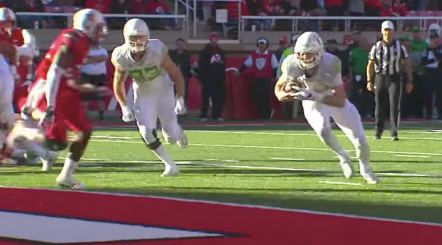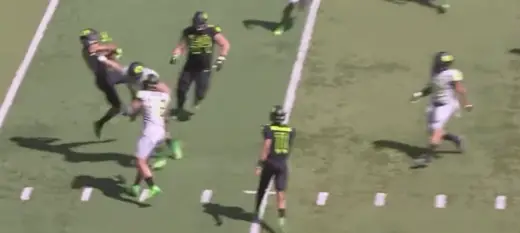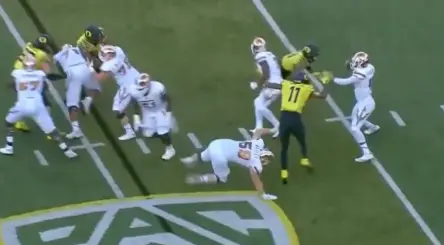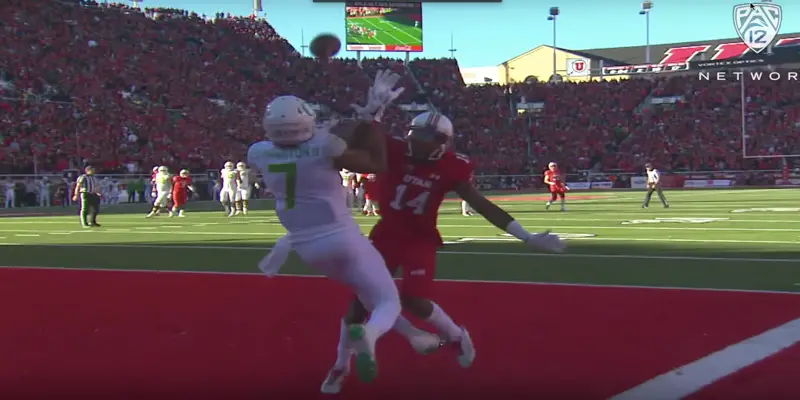Oregon’s biggest problem, as all Duck fans know, lies with the defense. The unit is ranked in the bottom 10 in the country, for a variety of reasons. I have faith that Jim Leavitt can get things fixed, but he is going to need help if the Ducks are going to return to double-digit wins.
I believe a strong offense can be a great contributor to helping the defense — not by outscoring opponents, but by controlling the game. Willie Taggart and his new staff have a lot of returning talent on a top-20 offense, including talented sophomore quarterback Justin Herbert.
With all the experience and firepower on the offensive side of the ball, I would like to see the Ducks try to control the game more. The Ducks can help out their defense by using the offense to control the tempo and game clock.

Justin Herbert Scoring Vs. Utah 2016
This is not quite what Ducks fans are used to seeing. Oregon is famous for its fast-break pace, developed and perfected under Chip Kelly. However, the fast-break offense isn’t the solution to every problem. In particular, it exposes a weak defense.
The fundamental nature of the fast tempo offense is to run a lot of plays in very little time, meaning that they don’t spend much time on the field. That allows the other team to keep the weak defense on the field, and in so doing control the game.
In 2016, the Kelly-coached 49ers used the fast-break offense pretty much exclusively. They ranked last in time of possession (TOP), but they also had the eighth-lowest number of plays in the league. In other words, the 49ers couldn’t get much offense going at all, and gave their opponents plenty of time to generate offense of their own. The 49ers went 2-14, and Kelly was fired.
By contrast, Bill Belichick‘s Patriots used the fast-break regularly, but not all the time. The Patriots were fourth in the NFL in TOP per game, and still had the seventh-most plays run per game. And, of course, they won the Super Bowl.
I think it is time for Oregon to adapt their style of offense to help protect a porous defense.
Oregon ranked 125th in TOP and 33rd in number of offensive plays per game last year. This tells me that Oregon is going full speed ahead all the time. But with the talent they have offensively, they can pick their spots and dictate tempo according to the situation. Great coaches like Belichick and Nick Saban have incorporated this concept into their offensive systems.
Football is all about situations. There are many different situations in a game. What is the down and distance, what is the score, how much time is left, etc.? The fast-break offense is not the solution to every situation that comes up. Therefore, if the team spends all of their time practicing it, they are going to get into situations that they are not properly prepared for. If just one of those situations occurs in the game, and the other team is better prepared for it, that can be the difference in the game. In fact, it has been the difference in countless football games.
To me, this has been Oregon’s biggest blind spot, probably because their fast pace has been so successful for them.
Up-tempo, no huddle should be the default setting for any offense, meaning it is probably applicable to 50 to 60 percent of offensive situations. It has too many advantages for the offense not to use it. For example, if the other team scores or is ahead, then you need to play as fast as possible and score as quickly as you can. In other words, you need to use the normal Duck football pace.

Defensive Stop Spring 2017
But if you are protecting a lead, that requires a different tempo, especially if your defense is weaker than your offense. What if there are two minutes left in the half and your defense cannot make a stop? Do you really want to run a fast tempo, risking going three and out in less than 30 seconds? You wouldn’t want to do that even if you were behind. That would be nearly as bad as a turnover.
If you have a dominant offense and weak defense, you generally need to keep the offense on the field and the defense off of it for as long as possible. This is where controlling the game comes into play.
In situations that require ball control, run the offense at a good pace, getting plays off with no more than 10 or 15 seconds left on the play clock. Keep gaining yards and eating into the game clock. In end-of-half or end-of-game situations (four minutes or less remaining), you are ideally looking to score with 10-30 seconds left on the game clock. If you go up-tempo in this situation, the best case scenario is that you will score really fast and leave the other team plenty of time to score on your poor defense. The worst case is that you’ll go three and out, won’t take any time off the clock at all, and still leave plenty of time to score on your poor defense.
Obviously, the last possession of the game is the most important one, but the possession before the half is still huge. If you can score and not leave the other team any time to answer, it’s like winning a turnover.
I have been around coaches who say that it is easy to go from a fast-paced tempo to a slower one when they need to. But how many times have football fans seen their team slow the tempo down when they are up one score with two minutes left in the ball game, and have something go very wrong? All they have to do is get a first down and the game is over, and they can’t seem to make it happen.
This happens to teams that practice all the time at one pace, and find themselves needing to play at a different pace in a game situation. A lineman or wide-out will somehow manage to false start or not line up correctly. Or receivers will run the wrong routes, or snaps will even be mishandled or hand-offs dropped. It is just like when teams that huddle all of the time try and run the hurry up. When they try to go fast, it looks like a “Keystone Kops” routine because they haven’t practiced it enough.

Ducks Defense
Using any method in a game that hasn’t been practiced and repeated will usually have disastrous results. The offense will get a penalty, which backs them up and makes them fail to convert the game-clinching first down. The other team then gets the ball back, and now they have time on the clock against your defense, with heartbreak on the horizon.
Oregon’s new staff has a perfect opportunity to practice and install this situational tempo football in the off-season. It would not only help take pressure off of a defense coming off of one of its worst years, but it would put more of the game in the hands of their more talented and experienced group.
The ability to control the pace of the game is not something that can be turned on like a light switch. But it would be well worth the effort for Oregon to take the time needed to make it a part of its identity.
Coach Ruskin Fiegenbaum
Beaverton, Oregon
Top Photo from YouTube Video
Related Articles:
Ruskin has been following the Ducks since the ’94 Rose Bowl. He graduated from the University of Oregon in 2007 and has been coaching football in the Portland-Metro area since 2008.

